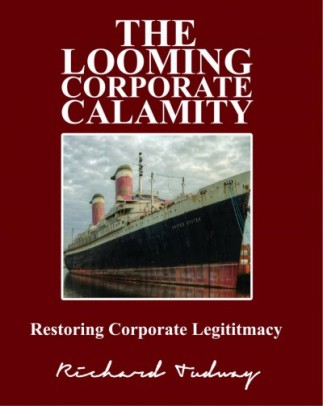 The Looming Corporate Calamity: Economist’s Provocative New Book Aims to Restore Global Corporate Legitimacy
The Looming Corporate Calamity: Economist’s Provocative New Book Aims to Restore Global Corporate LegitimacyHailed “A must for all critical thinkers”, Richard Tudway’s ‘The Looming Corporate Calamity: Restoring Corporate Legitimacy’ presents compelling arguments toward fixing the corporate governance crisis in today’s publically-traded corporations and limited liability companies. Through fourteen chapters and five supporting annexes, Tudway lays out evidence as to why the public’s confidence against the corporate world is at an all-time low, and how it is directly connected with the evolution of corporate governance principally in Anglo American jurisdictions. It’s a thought-provoking read for any student, practitioner or scholar of business.
Contact:
Richard Tudway
* Press Review Copies are available from the Media Contact
FOR IMMEDIATE RELEASE
United Kingdom – One look at the current economy and its related discord says it all; the public’s confidence in corporations has hit a dangerous-rock bottom. However, as one of the nation’s leading economists and visiting professors proves in his illuminating new book, corporate governance has been setting itself up for disaster since its dawn in the 19th century.
Richard Tudway’s ‘The Looming Corporate Calamity: Restoring Corporate Legitimacy’ unravels how the cracks in the system widened, and what could possibly be done to close them back up.
Synopsis:
The Looming Corporate Calamity by Richard Tudway is a masterful analysis of the evolution of the limited liability corporation from its 19th Century origins to today’s crisis in the corporate governance of publicly traded corporations. He argues that structural failures in the modern corporation and abuses of corporate power have triggered a collapse in public confidence. These failures centre on the classic agent/principal problem and the unitary board system common to Anglo American jurisdictions. He outlines what has to be done to reform corporate governance and restore corporate legitimacy. It is a book that needs to be read by all students of business, business leaders, other professionals and citizens at large who seek to understand why public confidence in corporate behaviour has now reached rock bottom. The problems, as he explains, are connected with the evolution of corporate governance principally in Anglo American jurisdictions.
In other jurisdictions governance arrangements have evolved differently. There are important lessons to be learnt from these differences. He identifies clearly the fundamental governance issues that have to be addressed and the reforms that have to be introduced. The book runs to 14 chapters with five supporting Annexes. Throughout it is supported with detailed references to key literature sources. Each Chapter has its own questions for review and tasks for readers to address in reaching a complete understanding of what is so fundamentally wrong with corporate governance as it stands.
“The main point I want to drive home to readers is that the fatal flaws in our corporate governance system are rampant in Anglo-American jurisdictions, but barely exist elsewhere,” explains Tudway. “This begs the questions, how did we get here? And what lessons can we take from elsewhere in the world?”
Continuing, “I attempt to provide answers in a way that will also urge readers to conduct their own further study and draw their own conclusions.”
Critics agree it’s a ground-breaking text. Paul Collins from the University of Birmingham comments, “Tudway’s book is doubly refreshing: it deals critically with two major corporate governance paradigms: the Anglo-American and the northern European. When China comes to appraise the relevance of overseas models (it is currently still as the stage of amalgamations and enhancing clout globally and tacking corruption internally), it will no doubt have a lot of food for thought. And in this connections, Tudway’s work with provide much wisdom.”
‘‘The Looming Corporate Calamity: Restoring Corporate Legitimacy’, from Heterodox Publishing Limited, is available now:
http://amzn.to/1L6EEug.
About the Author:
Richard Tudway is a practicing economist and visiting professor at several international businesses schools. He is a graduate of Oxford University where he was awarded an MA degree in Philosophy Politics and Economics. This was followed by postgraduate graduate studies at the University of Paris, Henley Business School and the University of London.
He has worked for the British National Economic Development Office and the Paris based OECD (Organisation for Economic Co-operation and Development). His career has also included senior positions in industry and investment banking. He was a Vice President of Security Pacific Merchant Bank where he advised on developments in money markets and capital markets. He is the founder and principal of the Centre for International Economics providing advice and consultancy on developments in the global economy. He has made an active contribution to the debate led by the OECD in defining the Framework of Corporate Governance
At Hult International Business School and elsewhere he teaches programmes covering corporate governance and other related topics including CSR (Corporate Social Responsibility) corporate finance, international finance and international trade and development.
 The Looming Corporate Calamity: Economist’s Provocative New Book Aims to Restore Global Corporate Legitimacy
The Looming Corporate Calamity: Economist’s Provocative New Book Aims to Restore Global Corporate Legitimacy